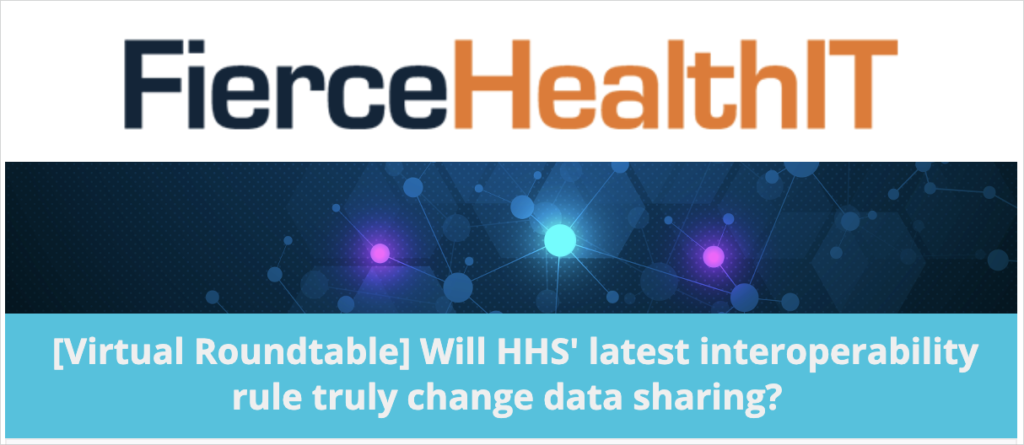On March 9. 2020, HHS finalized the “21st Century Cures Act: Interoperability, Information Blocking, and the ONC Health IT Certification Program.” These rules were proposed at the 2019 Health Information and Management Systems Society (HIMSS) conference in order to promote interoperability in health IT and give patients easier access to their health data. The rule was opposed by large EHR vendors and hospitals and had wide reaching support from technology vendors and patient advocacy groups since it compels large entities to give patients access to their data and discontinue blocking information for technology vendors.
FierceHealthcare summarized the new rules this way: “ONC’s final rule establishes secure, standards-based application programming interface (API) requirements to support a patient’s access and control of their electronic health information. The Centers for Medicare & Medicaid Services also released a proposed rule at HIMSS last year suggesting that Medicaid, the Children’s Health Insurance Program, Medicare Advantage plans and qualified health plans be required to make enrollee data immediately accessible by 2021.”

FierceHealthIT recently hosted a virtual panel titled, “Will HHS’ latest interoperability rule truly change data sharing?” to delve a bit into newly released rules from the Department of Health and Human Services’ Office of the National Coordinator for Health Information Technology (ONC) and the Centers for Medicare & Medicaid Services (CMS) that will allow patients to access and share their own health data.
Panelists included Jeff Smith, Vice President of Public Policy at AMIA, Claudia Williams, CEO at Manifest MedEx, and Cynthia Fisher, Founder and Chairman at patientRightsAdvocate.org.
The panel started by addressing the big takeaways from this news. Jeff Smith started the discussion by emphasizing the magnitude and implications of these rules. He honed in on the terms “without special effort” and “complete access” – these phrases are clearly intended to ensure that health information technologies can connect and easily exchange information.
Claudia Williams provided insight into the CMS rule, which will take specific action to compel a change in behavior along with a specific timeline. The CMS rule is giving hospitals until September to comply. Where the first two panelists agreed the timeline was surprisingly aggressive. Cynthia Fisher, a patient advocate, pointed out that these rules have been in the works for 3 years and they will finally give patients a functional, competitive experience. Patients will be able to fully participate just like other industries, comparing prices, clinical application, payment information and more. She went on to describe the rules as a “big, giant leap forward for patients” to get access to their complete data.
The panel further explored implications of the rules including privacy concerns. One panelist suggested a model where ONC could work with vendors to develop an attestation policy, so patients would be notified if an application they are downloading does or does not have privacy protections in place. Another suggestion included education so patients learn how to recognize when they are leaving a HIPAA protected environment. All panelists seemed to agree there are approaches to protect patient privacy without denying them access to their data.
When asked if these rules will disrupt the EHR market, one panelist wondered if it might force them to move forward and actually benefit the whole industry. There are innovators ready and willing to help, but information blocking has been a significant barrier. With that barrier removed, vendors are positioned to deliver the best products and services at the best cost, which can transform the system. Where the existing EHR system is built on revenue and billing, this could flip the model so that new entrants focus on the best outcomes for patients.
The moderator asked the panelists if this development would spur an update for HIPAA. None of the panelists believed it would, but all seemed to agree that some new legislation will be needed. One exciting idea: what if the motivations for all the players aligned? It would make data sharing within a value-based care construct a win – win. Use legislation to make sure we are caring for the most vulnerable and that policies are designed to get all of the stakeholders working together instead of hiding behind exceptions.
At Navigating Cancer we have been closely monitoring this issue and have often faced interoperability barriers as we work to improve cancer care. President and Founder, Gena Cook, told me, “I started Navigating Cancer with the vision of enabling patients to better participate in their care, and having access to their health information is paramount. We’ve been enabling this since 2012 and have experienced a significant amount of Information Blocking through the years from vendors which hindered our efforts to support patients, our North Star. We are pleased to see enhanced efforts and increasing legislation to support ensuring that patients have access to their own health information.”
We hope this is the beginning of a new era for patients, their caregivers and families in their personal healthcare journeys.
